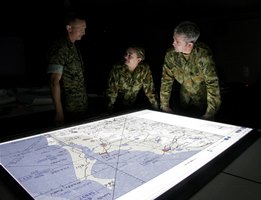26 July 2016
 Researchers at University of South Australia’s Mawson Lakes campus are putting the finishing touches to research that will help speed the military’s response to ever changing combat situations.
Researchers at University of South Australia’s Mawson Lakes campus are putting the finishing touches to research that will help speed the military’s response to ever changing combat situations.
By enhancing virtual behaviour modelling, military personnel will be able to watch combat simulations play out with reduced lead time and that more closely resemble real-world scenarios.
Director of UniSA’s Advanced Computing Research Centre, Professor Markus Stumptner said the work will allow Australia’s military personnel to prepare and execute advanced combat simulations across multiple environments much more quickly and efficiently.
“The tools we’re developing are being developed in collaboration with the Australian Government’s Defence Science and Technology Group and will provide users with a graphical modelling environment that allows subject matter experts to create and revise models of individual, squad, and larger group behaviour independently from individual simulation software packages,” Professor Stumptner says.
“This allows our military client to test and improve established doctrine. In really simple terms that could result in our client being able to challenge and alter a traditional approach to how military personnel respond when they come under fire, based on applying the latest data from real world scenarios.
“By enhancing the speed by which simulations can be created it allows military personnel to experience the most advanced, up to the minute combat scenarios using real world military tactics and procedures.
“This sort of capability will make them a world leader in performing combat simulations, allowing them to stay ahead of the curve in evaluating new tactics and equipment being considered for deployment.
“Our research incorporates what’s known as text understanding methods. This lets the system read existing written descriptions of the procedures and greatly reduces the time it takes to prepare new, more up to the minute simulation scenarios.
“The advantage that text understanding gives us is that it processes textual descriptions of the behaviour we’re seeing and automatically generates a first-cut graphical models based on those descriptions.
“This lets the user then revise models which can then be exported to run in a specific simulation environment or generate human-readable documentation of the behaviour.”
A further vote of confidence in the research outcomes being delivered by the Advanced Computing Research Centre is a continuation of Federal government funding which gives the team the opportunity to carry out our work for a further 12 months which allows the development of further capability for the client to generate simulation scenarios.
Background notes for Editors:
The project is being led by UniSA’s School of Information Technology & Mathematical Sciences through its Advanced Computing Research Centre and Knowledge and Software Engineering Laboratory, on behalf of its client, the Federal Government’s Defence Science and Technology Group.
The School of Information Technology & Mathematical Sciences is the largest information and communications technology provider in South Australia, and is regarded as one of the leading applied mathematics departments in Australia.
The Advanced Computing Research Centre (ACRC) is an integral part of UniSA's prominent School of Information Technology & Mathematical Sciences, combining academic rigour and research experience with a highly collaborative approach to provide new and cost effective computing solutions.
The Knowledge and Software Engineering Laboratory is part of the Advanced Computing Research Centre (ACRC) at the University of South Australia, specialising in high-level descriptions of programming, interoperability of integrated systems, and advanced knowledge technologies.
Defence Science and Technology Group is the Australian government's lead agency responsible for applying science and technology to safeguard Australia and its national interests.
As one of Australia’s largest employers of scientists and engineers, it delivers expert, impartial advice and innovative solutions for Defence and national security.
Media contact: Will Venn mobile: 0401 366054 email: will.venn@unisa.edu.au




